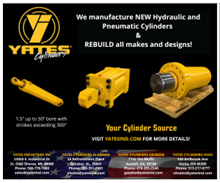A U.S. CBAM? Maybe Not, Executives Say
05/10/2023 - Some U.S. steel industry leaders on Wednesday expressed tepidness over imposing a European-style, C02-based tariff on imported steel.
“I’m not sure you need a (carbon border adjustment mechanism) per se — the market will reward companies that invest in lowering their carbon emissions,” said United States Steel Corporation senior vice president and chief strategy and sustainability officer Richard L. Fruehauf.
Fruehauf’s comment came in response to a question about the necessity of such a tariff at the annual Town Hall Forum, a signature AISTech event.
He and other executives said that while they believe mechanisms need to be in place at border to prevent wholesale dumping of dirty steel, a CBAM might not be the optimal solution.
“Because the next thing that comes after that is a domestic carbon tax,” Fruehauf said, adding that the point of Europe’s CBAM is level the playing field for producers, who have to pay a carbon tax and compete against foreign steelmakers that pay no such tax.
Of course, discussion about a carbon tariff is largely academic as it would require agreement on a way to measure CO2 content. And at the moment, there is no consensus.
“There’s going to be a lot of talk about that,” said Barry Schneider, president and chief operating officer of Steel Dynamics Inc. Steel Dynamics is a founding member of the Global Steel Climate Council, which in April proposed a standard for measuring carbon content.
“We’re already having very good discussions with customers,” he added.



.jpg?lang=en-US&ext=.jpg)
.gif?width=220&height=200&mediaprotectionhash=374c6b9a31f2b2fbfc7937391034efb46fd57feba997b9ad2ae9a0bd3d48329d&ext=.gif)

.gif?width=100&height=200&mediaprotectionhash=e2d5b15d68f84f22038524be6c58e5268d67b7f44494b544e29a8d53c5b959ba&ext=.gif)
